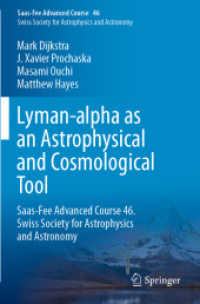Full Description
This updated learning companion is designed to assist professional counselors with a smooth transition from the DSM-5 to the DSM-5-TR. The text highlights diagnostic changes and new developments within the DSM-5-TR. Each chapter features updated research with implications for evidence-based practice alongside practical strategies for holistic, culturally-responsive, and wellness-based counseling. As with the original DSM-5 Learning Companion for Counselors, this revision is intended for counselors, counseling students, counselor educators, and mental health professionals who engage in mental health diagnosis and evidenced-based services. The DSM-5-TR includes some important changes of which counselors must be aware, and this updated learning companion will help them incorporate these changes into practice. This new edition addresses these noteworthy changes specifically, delineating the differences and guidance, as well as case examples.
Contents
Chapter 1 : Introduction and OverviewChapter 2 : Structural and Philosophical Changes to the DSM : A Historical OverviewIntroduction to Diagnostic ChangesPart One to Part Four OverviewPart One : Clinical Utility and Practice Implications for CounselorsPart One : IntroductionChapter 3 : Sociocultural Issues in Diagnosis in the DSM-5-TRChapter 4 : Culturally Responsive Case Conceptualization and Treatment Planning : Cultural FormulationChapter 5 : Practice Implications for CounselorsPart Two : Changes and Implications Involving Mood, Anxiety, and Stressor-Related ConcernsPart Two : IntroductionChapter 6 : Depressive DisordersChapter 7 : Bipolar and Related DisordersChapter 8 : Anxiety Disorders 1Chapter 9 : Obsessive-Compulsive and Related DisordersChapter 10 : Trauma- and Stressor-Related DisordersChapter 11 : Gender Dysphoria in Children, Adolescents, and AdultsPart Three : Changes and Implications Involving Addictive, Impulse-Control, and Specific Behavior-Related ConcernsPart Three : IntroductionChapter 12 : Substance-Related and Addictive DisordersChapter 13 : Disruptive, Impulse-Control, and Conduct DisordersChapter 14 : Personality DisordersChapter 15 : Specific Behavioral DisruptionsPart Four : Changes and Implications Involving Diagnoses Commonly Made by Other ProfessionalsPart Four : IntroductionChapter 16 : Neurodevelopmental and Neurocognitive DisordersChapter 17 : Schizophrenia Spectrum and Other Psychotic DisordersChapter 18 : Dissociative DisordersChapter 19 : Somatic Symptom and Related Disorders







